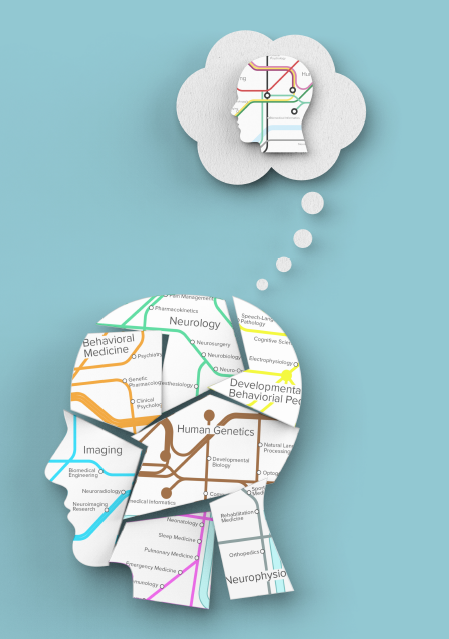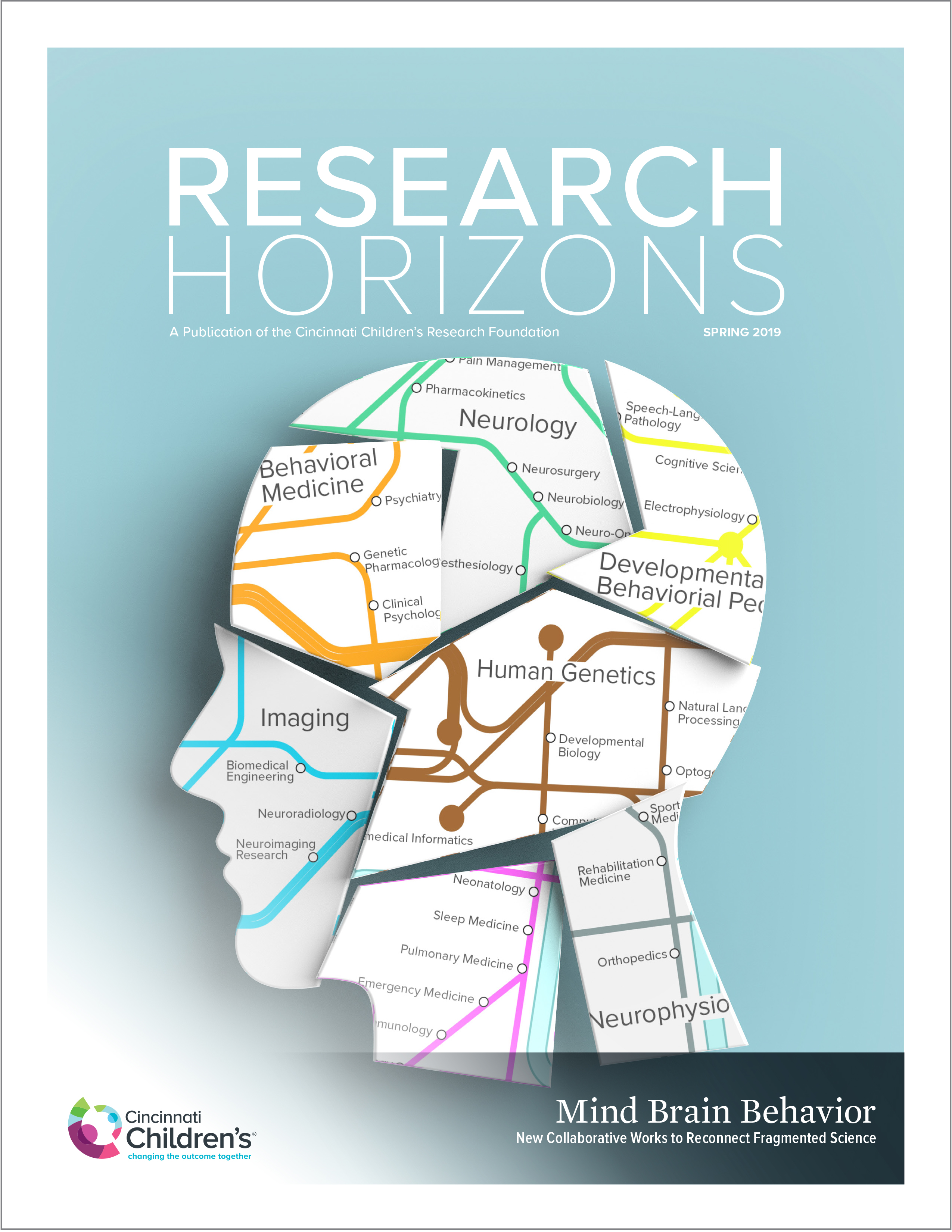Reimagining How We Think About Our Brains
Post Date: July 3, 2019 | Publish Date: Spring 2019

“Ultimately, we don’t want to just improve treatment of disease. We want to get to health and wellness. The only way to get there is to bring all these disciplines back together again”
—Tracy Glauser, MD
The brain is the body’s most complex organ, so complex that its study and treatment over the years has required breaking down the work into smaller pieces.
This fragmentation has allowed researchers and clinicians to concentrate on different functions controlled by the brain—movement, cognition, emotion, mental health, behavior, and so on. However, this narrow approach has tended to limit the power of discovery.
Now leaders at Cincinnati Children’s are building new connections and deeper collaborations across disciplines with its Mind Brain Behavior collaborative (MBB), launched internally in 2017. The mission: to serve as a catalyst for transforming our research and clinical care models with the goal of helping all children with behavioral, mental health and neurological conditions reach their optimal quality of life.
“This has been needed for a long time,” says Tracy Glauser, MD, Associate Director, Cincinnati Children’s Research Foundation. “Our research and care delivery systems continue to fragment into more and more subspecializations as we break topics down into smaller units that we can better understand. But if we hope to make transformational advances, we need to put the parts back together and look at the brain more holistically.”

Reducing barriers to innovation
The concept of a Mind Brain Behavior initiative took shape as dozens of leaders at Cincinnati Children’s joined initial working groups co-chaired by Margaret Hostetter, MD, Research Foundation Director and Chair of Pediatrics, and Brian Coley, MD, Radiologist-in-Chief.
Some groups focused on the clinical side, looking for ways to drive adoption of best practices and to streamline overlapping lines of care. Other groups focused on research—basic and translational.
Glauser and Lori Stark, PhD, Director, Behavioral Medicine and Clinical Psychology, were chosen to co-direct the MBB initiative. Their goals include building a larger community of brain-focused researchers, recruiting new faculty in selected fields, assessing infrastructure needs and accelerating innovation, and building integrated models of clinical care. Much of this work will continue for months and years to come, but several initiatives are underway.
- A team led by Steve Danzer, PhD, has launched the Center for Pediatric Neuroscience to provide a “virtual home” for basic scientists working on MBB projects across divisions.
- Another team led by Susmita Kashikar-Zuck, PhD, is building the Alliance for Clinical and Translational Science to focus on later stages of the research pipeline.
- An internal application and funding process also has begun to support pilot projects in these areas through the Research Innovation Pilot Funding Program at Cincinnati Children’s
“We believe investing in infrastructure and key recruits will speed discovery,” Stark says. “We believe that building alignment and synergy across basic and translational research will help drive improvement in clinical areas.”

Clinical focus on new models of care
Clinically, MBB is re-shaping multidisciplinary teams to bring new models of care to more patients, starting with traumatic brain injury, cerebral palsy, and mental health.
Mental health is a particularly challenging area. The National Alliance on Mental Illness estimates that one of every seven children aged 2-8 years, and one in five youths aged 9-17 years, experience a behavioral or mental condition. However, interventions often can be delayed by a decade or more with only 15 to 25 percent of children receiving the care they need.
MBB is addressing this crisis in our community by developing an early intervention model that places psychologists in primary care clinics to address emotional and physical health needs as they emerge, in one seamless system.
“This integration will make behavior services available to substantially more children in a trusted setting—their primary care home. This reduces barriers of stigma and the inconvenience of extra visits that can occur in a subspecialty system of care,” Stark says.
Likewise, we are building alternative management models to help children and adolescents in mental health crisis with the goals of preventing emergency room visits and reducing unnecessary hospitalizations.
Similar integrated care models are being developed for other clinical conditions within MBB.
A long-term effort
With so much to be done, it will take several years for the MBB initiative to bear its most important fruits.
“Ultimately, we don’t want to just improve treatment of disease. We want to get to health and wellness. The only way to get there is to bring all these disciplines back together again,” Glauser says. “And because of our strong resources, because of our culture of collaboration, we really believe we can do this here.”
—By Tim Bonfield





